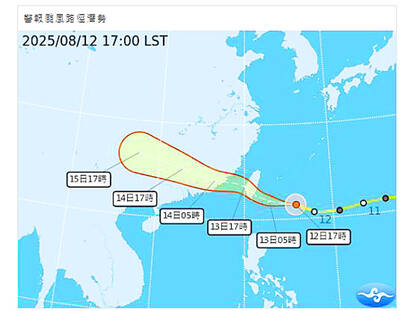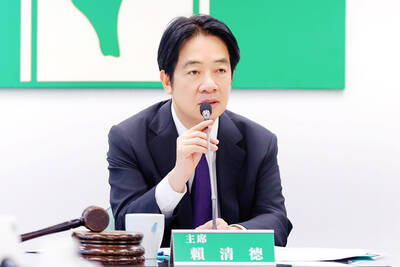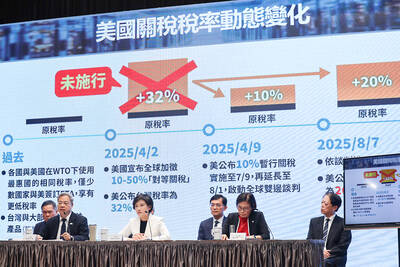About 10,000 protesters nationwide are expected to take to the streets today — the first anniversary of Japan’s devastating earthquake and tsunami disaster — to demand that the government scrap plans for ongoing nuclear plant construction.
Organizers said yesterday that the “Bidding Farewell to Nuclear Power Parade” is being held to commemorate the tragedy of the magnitude 9 earthquake and ensuing tsunami that caused the Fukushima Dai-ichi nuclear power plant to fail, plunging Japan into the worst nuclear crisis in its history.
Amid global concerns over nuclear safety, the parade will also build on local momentum created at April’s successful “Sunflower No Nuke Action,” in which more than 16,000 people across Taiwan participated.
“We want the world to never forget the hard lessons it has learned,” said Tsui Su-hsin (崔傃欣), a spokeswoman for the organizers.
According to Tsui, the protests are scheduled to take place in Taipei, Greater Taichung and Greater Kaohsiung, where about 100 civic groups will urge the government to decommission the existing three nuclear power plants as soon as possible and stop construction of the fourth nuclear plant in Wanli (萬里), New Taipei City (新北市).
Protesters will also call on the government to implement energy-saving policies and remove the radioactive nuclear waste stored on Lanyu (蘭嶼, also known as Orchid Island) off the coast of southeastern Taiwan, she said.
The planned simultaneous protests suggest that the state-run Taiwan Power Co’s (Taipower) safety checks do not seem good enough to quell the unease among members of the public.
The company said on Friday it had finished a comprehensive safety assessment of the country’s four nuclear power plants, with some machines and areas which were not due to be checked having been examined as well.
“With the approach of the first anniversary of the Japanese nuclear crisis, we’d like to assure the public that our plants are safe,” said Tsai Fuh-feng, director of Taipower’s Department of Nuclear Generation.
Besides regular checks, the three operating nuclear power plants and the one under construction all passed stress tests, which are required in European countries, he said.
Although there are still some parts of the plants that need reinforcement, Tsai said all the plants are “safe enough to counter a devastating disaster similar to the one that happened in Japan.”
After the March 11 incident in Japan last year, Taipower reviewed its safety procedures and came up with an “ultimate response guideline” specially tailored for Taiwan, to cope with similar compound disasters, Tsai said.
Following the guideline, the company can respond immediately and take critical action within an hour after a disaster, he added.

GET TO SAFETY: Authorities were scrambling to evacuate nearly 700 people in Hualien County to prepare for overflow from a natural dam formed by a previous typhoon Typhoon Podul yesterday intensified and accelerated as it neared Taiwan, with the impact expected to be felt overnight, the Central Weather Administration (CWA) said, while the Directorate-General of Personnel Administration announced that schools and government offices in most areas of southern and eastern Taiwan would be closed today. The affected regions are Tainan, Kaohsiung and Chiayi City, and Yunlin, Chiayi, Pingtung, Hualien and Taitung counties, as well as the outlying Penghu County. As of 10pm last night, the storm was about 370km east-southeast of Taitung County, moving west-northwest at 27kph, CWA data showed. With a radius of 120km, Podul is carrying maximum sustained

Tropical Storm Podul strengthened into a typhoon at 8pm yesterday, the Central Weather Administration (CWA) said, with a sea warning to be issued late last night or early this morning. As of 8pm, the typhoon was 1,020km east of Oluanpi (鵝鑾鼻), Taiwan’s southernmost tip, moving west at 23kph. The storm carried maximum sustained winds of 119kph and gusts reaching 155kph, the CWA said. Based on the tropical storm’s trajectory, a land warning could be issued any time from midday today, it added. CWA forecaster Chang Chun-yao (張竣堯) said Podul is a fast-moving storm that is forecast to bring its heaviest rainfall and strongest

President William Lai (賴清德) yesterday criticized the nuclear energy referendum scheduled for Saturday next week, saying that holding the plebiscite before the government can conduct safety evaluations is a denial of the public’s right to make informed decisions. Lai, who is also the chairman of the Democratic Progressive Party (DPP), made the comments at the party’s Central Standing Committee meeting at its headquarters in Taipei. ‘NO’ “I will go to the ballot box on Saturday next week to cast a ‘no’ vote, as we all should do,” he said as he called on the public to reject the proposition to reactivate the decommissioned

TALKS CONTINUE: Although an agreement has not been reached with Washington, lowering the tariff from 32 percent to 20 percent is still progress, the vice premier said Taiwan would strive for a better US tariff rate in negotiations, with the goal being not just lowering the current 20-percent tariff rate, but also securing an exemption from tariff stacking, Vice Premier Cheng Li-chiun (鄭麗君) said yesterday. Cheng made the remarks at a news conference at the Executive Yuan explaining the new US tariffs and the government’s plans for supporting affected industries. US President Donald Trump on July 31 announced a new tariff rate of 20 percent on Taiwan’s exports to the US starting on Thursday last week, and the Office of Trade Negotiations on Friday confirmed that it